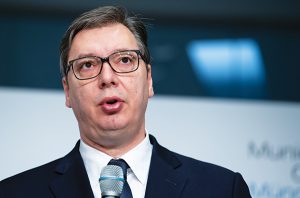Bloomberg
Serbia, traditionally one of Russia’s closest allies in Europe, is trying to put some distance between itself and Moscow as the war in Ukraine strains ties between the two countries and their leaders.
In an interview in Belgrade, President Aleksandar Vucic dismissed territorial claims in Ukraine by Vladimir Putin and predicted the “worst is yet to come†for the conflict as both sides dig in. Vucic, who had dozens of meetings with Putin in recent years and took Russian lessons to be able to speak with him directly, said he hadn’t talked with his counterpart for “many months.â€
“We, from the very beginning, said that we were not able and we could not support Russia’s invasion against Ukraine,†Vucic said at his residence in the Serbian capital on Tuesday. “For us, Crimea is Ukraine, Donbas is Ukraine — and it’ll remain so.â€
Serbia has historically sought to balance its geopolitical and economic interests between east and west, but the comments underline the gradual shift since Putin’s invasion of Ukraine almost 11 months ago. That’s significant as European allies try to isolate Russia with the continent facing its most perilous period since the Cold War.
Belgrade’s reluctance to join the US and the European Union in sanctions against Russia put Serbia under increased pressure to cut ties with Putin and his energy supplies even as the war hit the economy and sent inflation soaring.
Vucic, who was re-elected by a landslide last year, says EU membership is his ultimate goal. But he is resisting the sanctions effort because of Russian backing for his refusal to recognize the independence of Kosovo and Serbia’s own experience with economic isolation. Russia also sells natural gas to his country at below the market rate.
Yet it would be wrong to assume his government fully endorses the leadership in Moscow, he said. “We are not always jubilant about some of their stances,†said Vucic, 52. “We have a traditionally good relationship, but it doesn’t mean that we support every single decision or most of the decisions that are coming from the Kremlin.â€
The alliance between the two Eastern Orthodox nations goes back centuries. After cooling during Soviet times under Yugoslav leader Josip Broz Tito, it regained momentum during the Balkan wars and was then cemented by Nato’s 1999 intervention that ended the war in Kosovo.
Economically, Serbia has been moving out of Russia’s orbit for years. The country accounts for about 6% of Serbia’s foreign trade. The EU is by far the biggest partner. To steady finances late last year, Serbia secured €2.4 billion ($2.6 billion) funding from the International Monetary Fund.
 The Gulf Time Newspaper One of the finest business newspapers in the UAE brought to you by our professional writers and editors.
The Gulf Time Newspaper One of the finest business newspapers in the UAE brought to you by our professional writers and editors.
